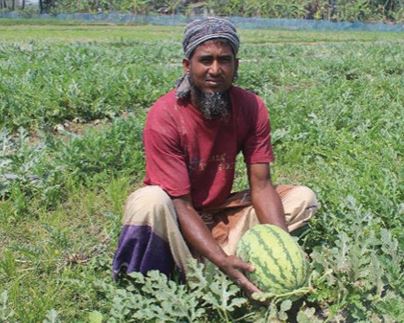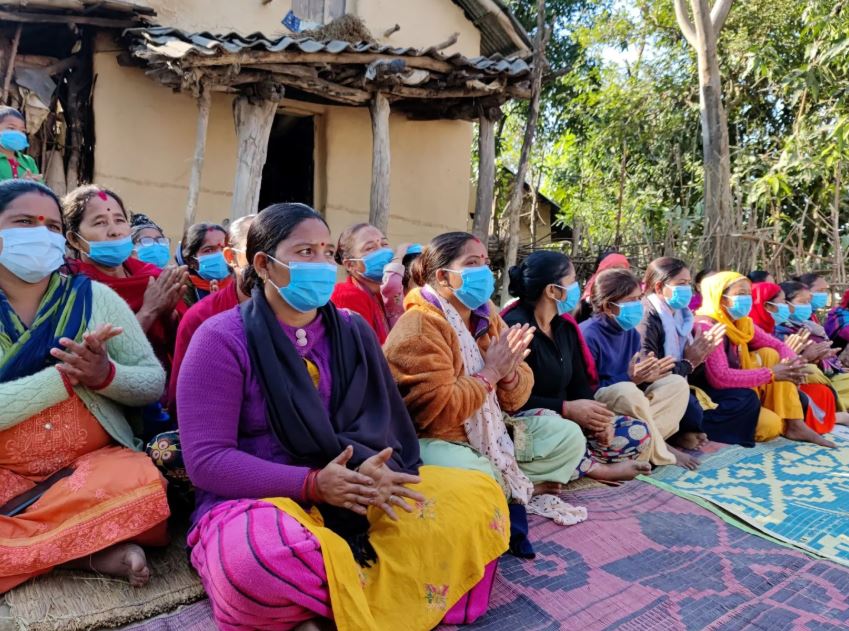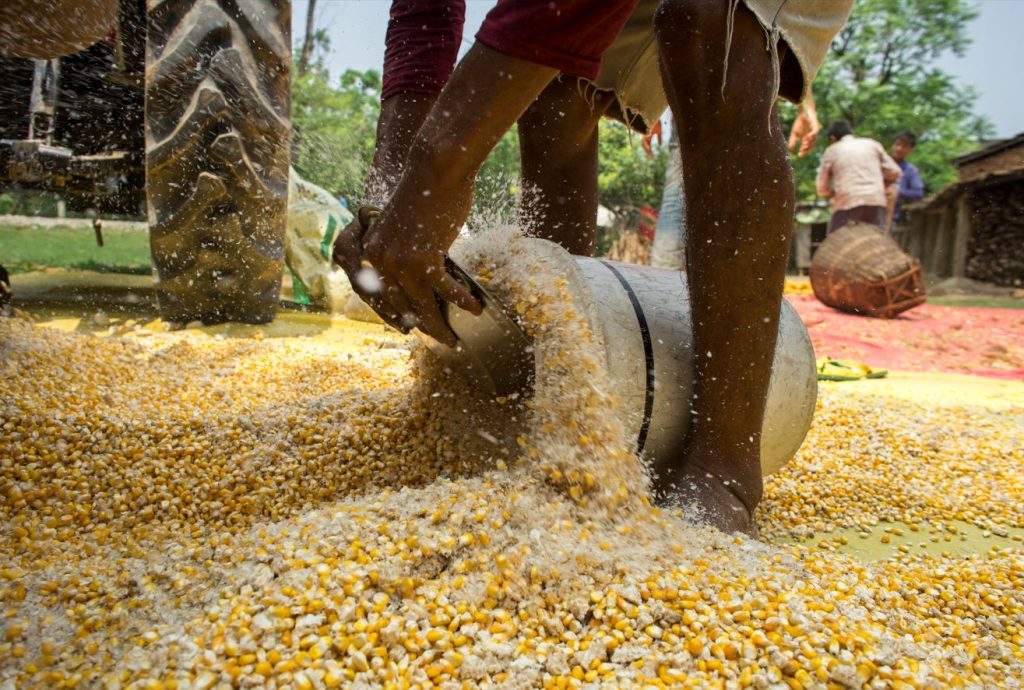“Empowering Farmers in Bihar”: The Impact of Raised Bed Technology
A Decade of Agricultural Transformation in Purnia and Katihar, Bihar
Authored By
Dr Shubham Durgude, Dr Raj Kumar Jat, Dr Pazhanisamy, Dr Suneel Kumar, Amit Kumar Lenka, Subhayan Das
A narrative of change
Over the past decade, the districts of Purnia and Katihar in Bihar have undergone a remarkable agricultural transformation. Previously recognized for their flourishing banana plantations, these regions encountered a significant challenge when the Panama Wilt disease devastated the banana crops, placing farmers in a precarious position. With bananas’ unsustainability, farmers transitioned to maize—a crop with limited familiarity. This shift initiated a journey characterized by learning, experimentation, and eventful success, bolstered by initiatives such as the Climate-Smart Village and Climate-Resilient Agriculture programs spearheaded by the Borlaug Institute for South Asia (BISA). The incorporation of raised bed technology further revolutionized agriculture in Purnia and Katihar. What began as an obstacle evolved into a narrative of innovation, resilience, and progress.
The Banana Crisis and Transition to Maize
Not long ago, bananas were the prominent crop in Purnia and Katihar. The banana plantations thrived, generating substantial income and sustaining the local economy. However, a crisis emerged when Panama Wilt, a soil-borne disease, devastated banana fields, wiping out entire plantations. Consequently, farmers were compelled to explore alternative crops, and maize emerged as a viable option. Despite their limited knowledge of maize and uncertainty regarding its economic viability, farmers opted to experiment with it. The initial years were fraught with challenges, including low yields and questions regarding hybrid selection, water requirements, and pest management. However, through perseverance, farmers began to observe positive outcomes.

Maize: From Novelty to Staple
A pivotal moment occurred when farmers recognized the significance of selecting appropriate hybrid varieties. They learned to choose hybrids based on factors such as maturation period and yield potential, developing expertise in matching crops to their specific fields. Even kharif rice farmers adapted their cropping systems by synchronizing shorter-duration rice hybrids with the rabi maize planting cycle, ensuring timely preparation for maize cultivation. This synchronization was not derived from textbooks but emerged from experiential learning and growing expertise. Post-harvest management practices also improved, facilitating a smoother transition between crops. Over time, maize not only replaced bananas but also became the cornerstone of the local economy. Today, many farmers view the maize harvest season as a time of celebration—not only for the financial returns but also for the economic security it affords. Families now plan weddings, secure their futures, and support their children’s education with a stable income from maize production.
Raised Bed: A Transformative Innovation A significant innovation in this journey was raised bed technology introduced by BISA, designed to enhance farming efficiency, particularly for winter maize. Raised beds optimize water delivery by directing it to the root zone, reducing wastage and improving irrigation efficiency by up to 30%. This technology proved transformative for farmers in Purnia and Katihar, where water scarcity is critical during the dry season. Raised beds also mitigated soil compaction and waterlogging, resulting in healthier crops, improved yields, and reduced costs. Farmers humorously refer to raised beds as “VIP seats” for their crops, noting the optimal conditions they provide for growth.

Expanding Horizons: How Raised Beds Paved the Way for Crop Diversification
The success of maize on raised beds cultivated on raised beds facilitated the introduction of various other crops. Vegetables such as tomatoes, brinjal, and chili flourished, benefiting from raised beds’ advantages—improved drainage, healthier root systems, and more efficient water utilization. This additional source of income diversified farmers’ risks. Intercropping with potatoes also gained popularity, allowing farmers to maximize land potential while diversifying risk. This diversification was not premeditated; it was a natural adaptation to changing conditions. Farmers survived and thrived, demonstrating that opportunities exist for those willing to innovate despite challenges.

A Socioeconomic Lifeline
Maize has evolved beyond merely a crop; it has become a socioeconomic lifeline for families in Purnia and Katihar. The income generated from maize is intricately woven into their daily lives, funding education, weddings, etc. The rise of ethanol production has further expanded opportunities, granting farmers access to larger markets and better prices. Women have also assumed new roles in this transformation, taking on responsibilities in vegetable management and small business operations. Farmers often comment that their wives are now as entrepreneurs as they are agriculturists.

Farmers with a Tech-Savvy Mindset
What renders this transformation particularly noteworthy is the farmers’ mindset. In Purnia and Katihar, technology is perceived not as a threat but as an opportunity for growth. Whether it involves selecting the right hybrid or managing raised beds with precision, farmers approach agriculture with the expertise of seasoned professionals. Their success is not solely attributed to tools or techniques but their willingness to experiment, learn from failure, and ultimately succeed. As Sakaldev, a farmer, aptly stated with a smile, “We might not have laptops, but when it comes to maize farming, our minds are more adept than any computer.”
Challenges and Future Prospects
The journey to success in Purnia and Katihar has not been devoid of hurdles. The initial cost of adopting raised bed technology was substantial, and access to hybrid seeds posed challenges. Mechanization remains difficult in certain areas, while knowledge gaps persist in remote villages. Nevertheless, these challenges have served as catalysts for growth. With support from BISA and programs like the Climate Resilient Agriculture Program and Climate Smart Village initiative, these challenges are being systematically addressed. This narrative transcends agriculture; it embodies resilience, adaptability, and transformation. From the decline of banana plantations to the rise of maize as a staple crop, the farmers of these districts have transformed challenges into opportunities. Raised bed technology has played a pivotal role, but the true agents of change are the farmers themselves—their determination, ingenuity, and adaptability. Today, Purnia and Katihar exemplify how small innovations and unwavering resolve can pave the way for a brighter future in agriculture.
Acknowledgments
BISA gratefully acknowledges the funding support by the Bihar government and the wholehearted participation of all partners and farmers. The editing by Prof. Arun K. Joshi, MD BISA is gratefully acknowledged.








